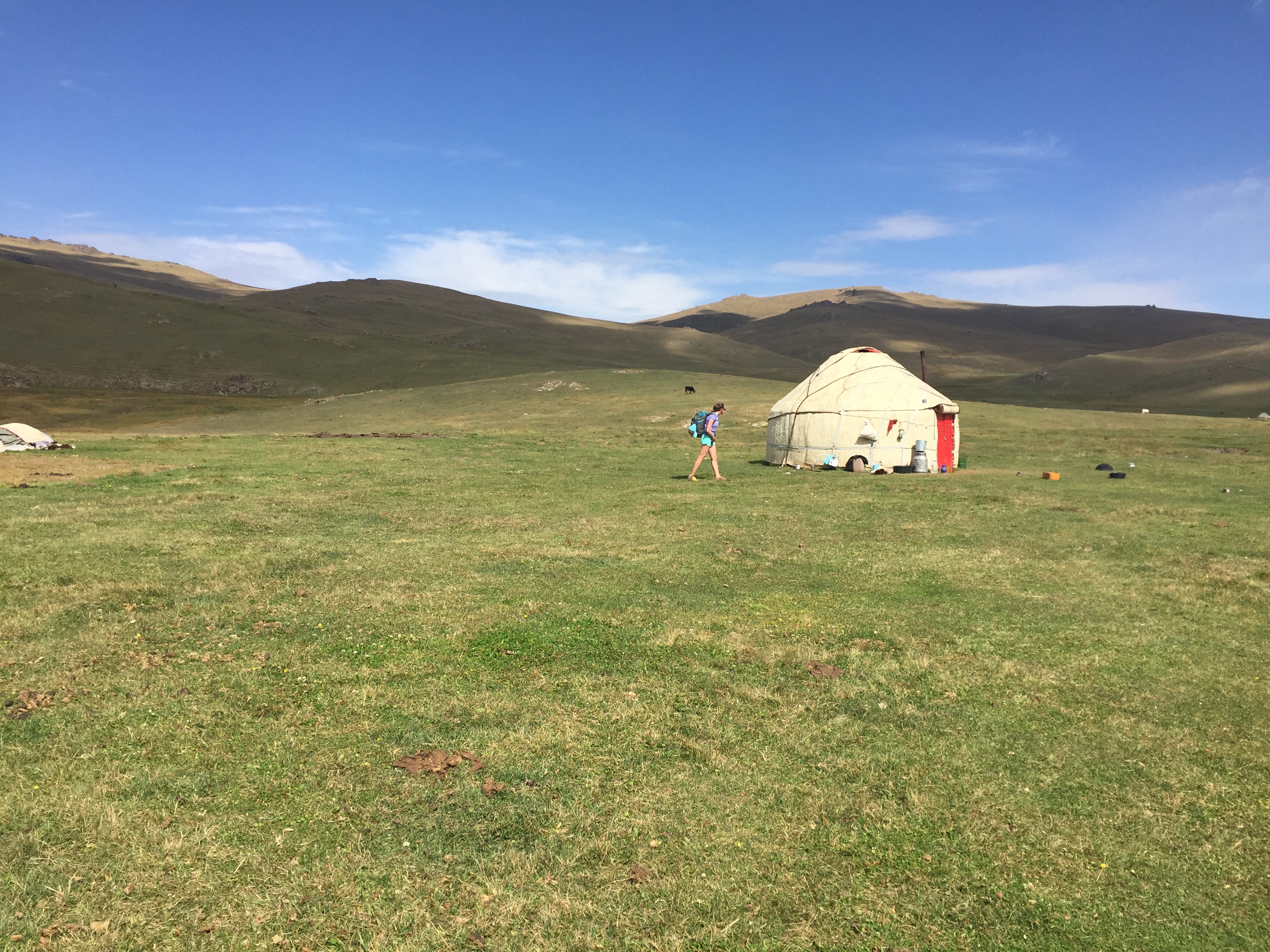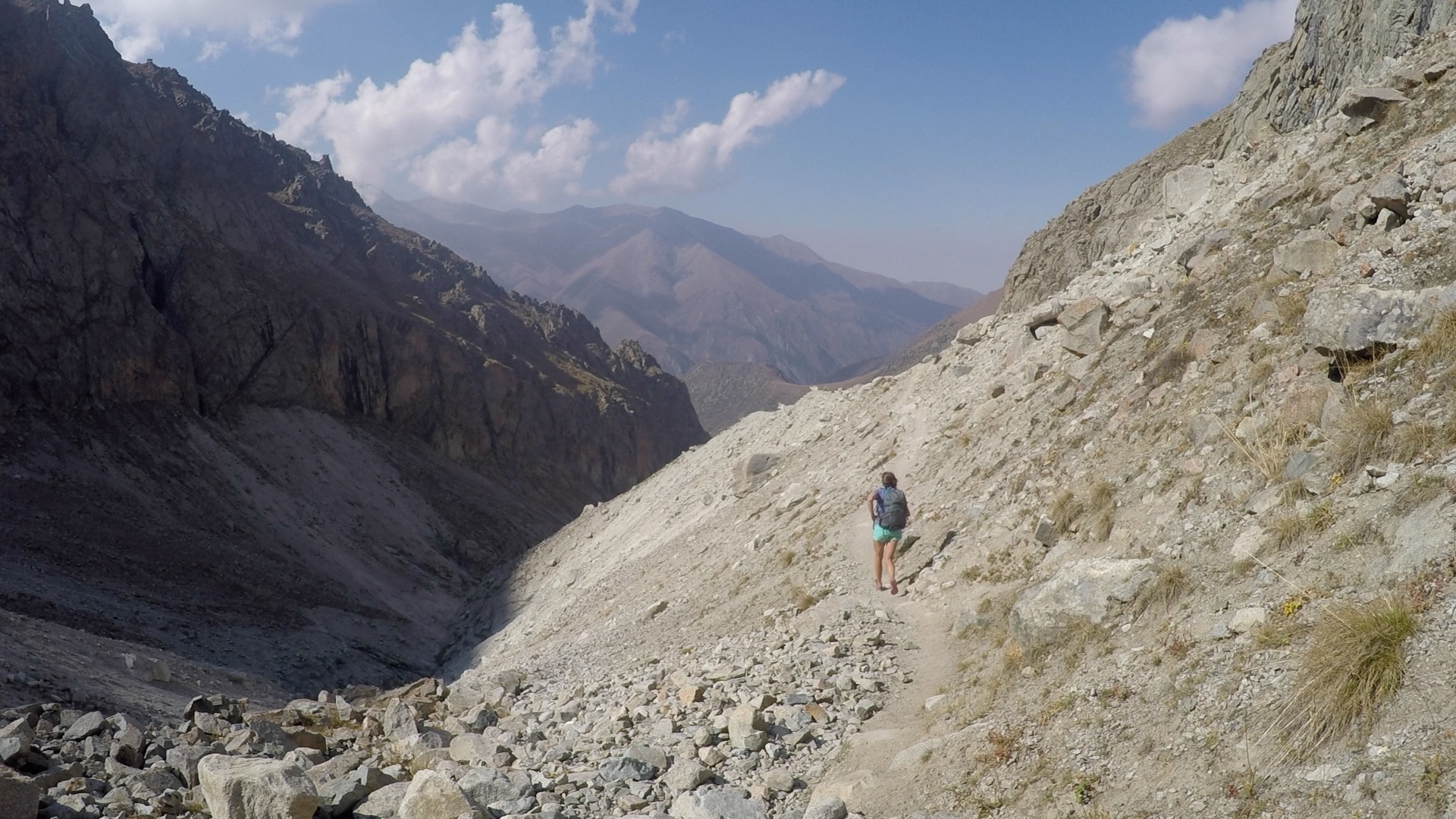"If you are dreaming of an adventure, it’s important to you, and you need to make it happen. If it doesn’t seem possible, make a list of all of the things that stand in between you and your big adventure. Perhaps it’s your job, health, money, skills, etc. Make a list and figure out how you can change all of those things, so you can make your adventure happen. Trust me, you’re capable of so much more than you think." We caught up with TRIBE adventurer Jenny about her recent adventure in the Tien Shen Mountains in Krgyzstan.
You were the first person to run solo and unsupported across the Tien Shen Mountains in Kyrgyzstan. What was it about the challenge that enticed you in the first place?
I grew up in the Canadian Rockies, and mountains have always felt like home for me. My desire to go to the Tien Shan was born from a need to explore mountains, and during my research of this mysterious mountain range I somehow came up with the idea that I would cover the whole thing on my own two feet. I’ve been a runner for a long time, looking for bigger challenges every year, and I began to wonder just how far it was possible to run. This seemed like a great way to find out.

How much did you have to improvise when it came to your route? Was it a case of having a plan for each day of the expedition? Or just taking it day-by-day?
Because no maps of the interior existed, the route that I had plotted in my GPS was really just a hopeful guess created through endless zooming on satellite images. I had no idea if my routes would work out, and many times they didn’t. I could often find nomads to give me advice, but they would usually only know their small territory, so it really was a case of planning day to day and being really flexible. My original ‘route’ that I plotted in my GPS did not match very closely to the track that I did in reality!
It’s fair to say you went through a lot during your time there. What were the toughest moments? Do you ever look back and wonder how you managed it?
I still can’t believe I got away with it… So many difficult moments and situations unfolded, and I really don’t know how I managed. I started the adventure by succumbing to altitude sickness that plagued me for nearly a week (and resulted in a host of poor decision-making), got lost on several occasions, ran out of water on even more occasions, had a pretty severe near-death experience, and got bad food poisoning at the very end which took me days to recover from. Things got pretty real out there!
You’re an incredibly driven person, so to read about how close you were to quitting throughout the journey really hits home. How did you keep yourself going?
There’s an old adage that says, “when you think about quitting, remind yourself why you started”. I went to Kyrgyzstan to have a real adventure and to push the limits of what I was capable of. The breakdowns along the way were like validations that I was truly pushing myself hard. And when that motivation fails, there was always the reality that if I didn’t keep going, I would be stuck out in the mountains and would never get home. You have to keep moving!

In contrast to the lows, what were the highlights? Can you look back and enjoy these more now?
I had highlights every day that I’ll never forget. I enjoyed perfect mountain sunsets, stunning alpine lakes, and enjoyed true alpine wilderness - my favourite natural environment. But my highlight has to be the time I spent with the Kyrgyz nomads - they showed me so much incredible kindness and hospitality along the way and taught me a lot about mountain culture.
How did you celebrate finishing the run?
I told myself that I would celebrate - I’m pretty sure I looked forward to a nice hotel and a big pizza the whole 23 days - but when I got there, it was kind of anti-climactic. I had been running for so long that it was just part of who I was, and when I got up the first morning after finishing I didn’t really know what to do with myself, and I really missed my tent and the mountains. The truth is, I still haven’t really celebrated what was to this day one of my favourite achievements.
Was a solo expedition through an unfamiliar environment something you were ever discouraged against because of your gender? Do you think it affected how you were treated whilst out there?
Constantly. The funny thing is, though, because everyone I met perceived what I was doing to be far more dangerous because I was a woman meant that everyone was overwhelmingly hospitable and even protective towards me. There is a global perception that the world is a dangerous place for a woman, and because of that, the global community actually compensates by being very friendly towards a woman. In every village I stayed in, people went out of their way to make me feel safe and welcome.
How do you physically and mentally prepare for an expedition like this? Can you truly prepare for something like what you experienced?
I think being quite experienced in endurance sport helped the most - the hardest thing, mentally, about endurance is the long, slogging hours on your own. Being quite good at handling that helped a lot. I’m also quite experienced in traveling off the beaten path, so while I had no idea what Kyrgyzstan or Central Asia would be like, I at least already knew that I could adapt to a strange environment.
Experience helps, but it’s really impossible to be completely prepared. Besides, it’s not an adventure unless it’s outside of your comfort zone.
What mental and physical practices do you follow when trying to cope with the challenges you face along your journey?
I’ve come up with a few techniques over the years to get me through. One of the hardest parts of going solo is that you are completely alone with the thoughts in your head - if they turn negative, only you can pull yourself out of that. It’s important to identify problems and fix them right away. I always carry headphones so I can listen to music that will improve my mood, or tune in to podcasts when I’m feeling bored or the distance is looking too great and I need a distraction. A surprise discovery on this adventure was how much having a camera helped me. Setting up my small camera to take footage of the adventure forced me to be more mindful and aware of my surroundings, and also connected me back to the world at home who I would eventually share this footage with. I never thought that cameras could add purity and connectedness to an expedition.
Growing up, did you always know you were going to end up doing adventures like this?
Absolutely not! I thought I would go to university and that would lead to a “real job” and that would be that. Not very exciting, but it was what I had always been told life was about. Travel and the outdoors were always my biggest passions, but I thought they would just be something that I would squeeze in on the sides. I never knew that I would end up needing to do big adventures like this - I didn’t even know such a world existed.
It seems as if there are two sides to your adventures; the physical aspect and the prospect of heading into the unknown. What is it about going into the unknown and making your own path that motivates you?
It’s hard to describe. I think it’s just something innate in me that I am always motivated to see what’s around the bend. I hate routine and predictable outcomes. I have this deep need to see everything on this incredible planet of ours, so I think that’s a big part of what pushes me off the beaten path and to discover corners of the world that I otherwise would never get to learn about.
What inspires and motivates you to continue taking up new challenges? Do you have any upcoming?
One thing I’m learning is that we are all capable of more than we think. When I decided to run across Kyrgyzstan, I truly didn’t know if it was possible and I was insanely terrified of how great the challenge was ahead of me. But, I achieved it, so knew I had to try something harder. Since running across the Tien Shan, I decided to run across a mountain range on every continent, and I’m specifically picking mountains where remote mountain communities still exist, much like the experience I had with the Kyrgyz nomads. In 2017, I ran across the Atlas Mountains where the Berbers were my hosts, and this year I’m going to run across the Sierra Occidental of Bolivia/Chile where the Quechua live.
Can you tell us about any expeditions you’ve seen recently that have impressed you?
I’m more impressed by the people and what they overcome than the actual expeditions themselves. I’ve been just as inspired by a woman overcoming her fears to go bikepacking for two nights in Scotland as I am by world-first expeditions to the previously unreachable corners of our planet. I’m particularly captivated by ocean expeditions and am currently (finally) reading Sarah Outen’s book from her round-the-world expedition, and the ocean crossings that she accomplished on her own sound truly daunting and impressive to me.
How has the exploration of the unknown and the experience of different cultures shaped you as a person?
I think it makes you more adaptable by taking you away from your comfort zones, and by seeing how other cultures live, question and challenge the way you live your own life (in a good way). But most importantly I think that experiencing other cultures makes you more empathetic. The way the world has shifted politically in the last few years is a good and scary example. I truly feel that if more people shared and experienced other cultures they would have a more empathetic outlook on other communities.
What advice would you give to people inspired by your path and the adventures you’ve embarked on?
Go for it. You have to go for it! If you are dreaming of an adventure, it’s important to you, and you need to make it happen. If it doesn’t seem possible, make a list of all of the things that stand in between you and your big adventure. Perhaps it’s your job, health, money, skills, etc. Make a list and figure out how you can change all of those things, so you can make your adventure happen. Trust me, you’re capable of so much more than you think.
Read more about Jenny's journey here.


